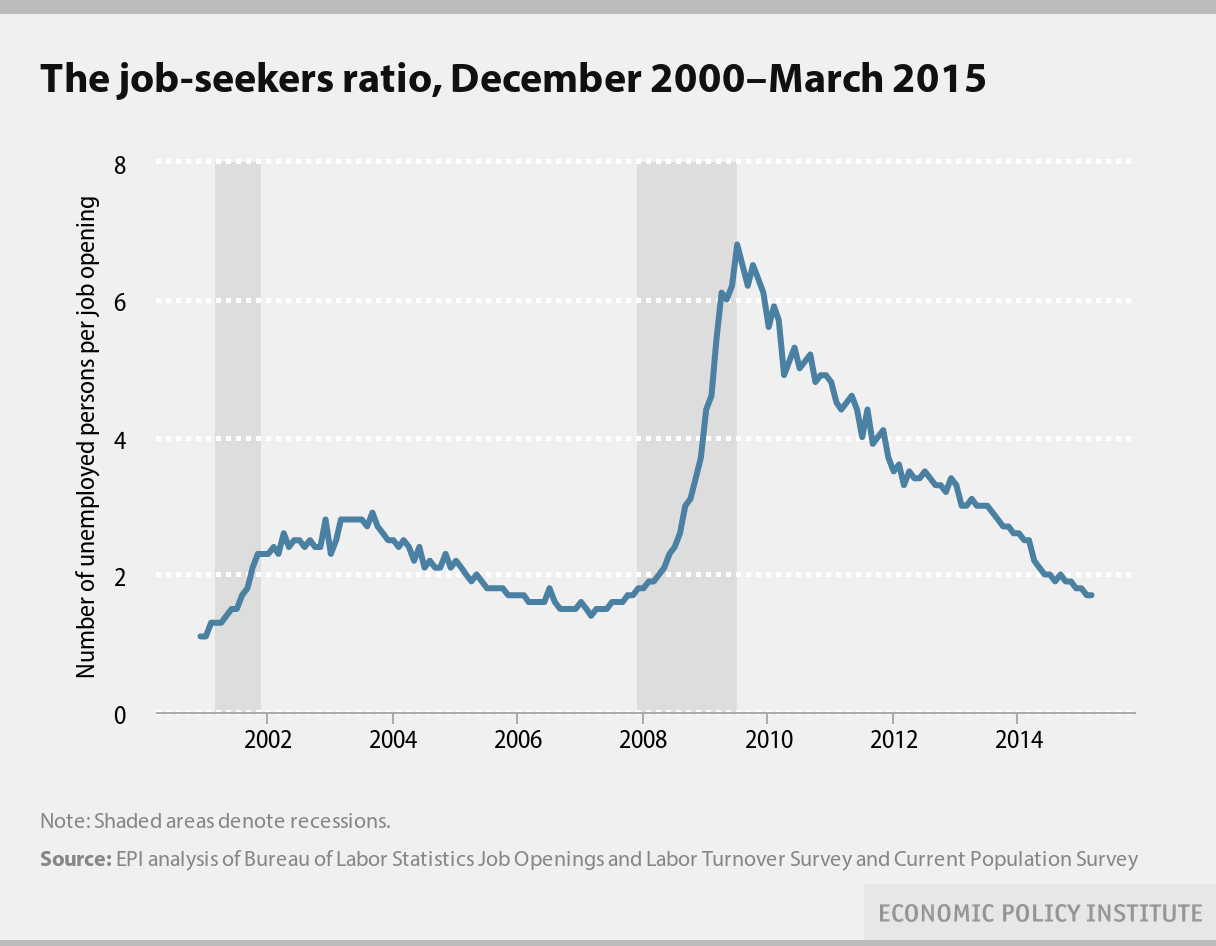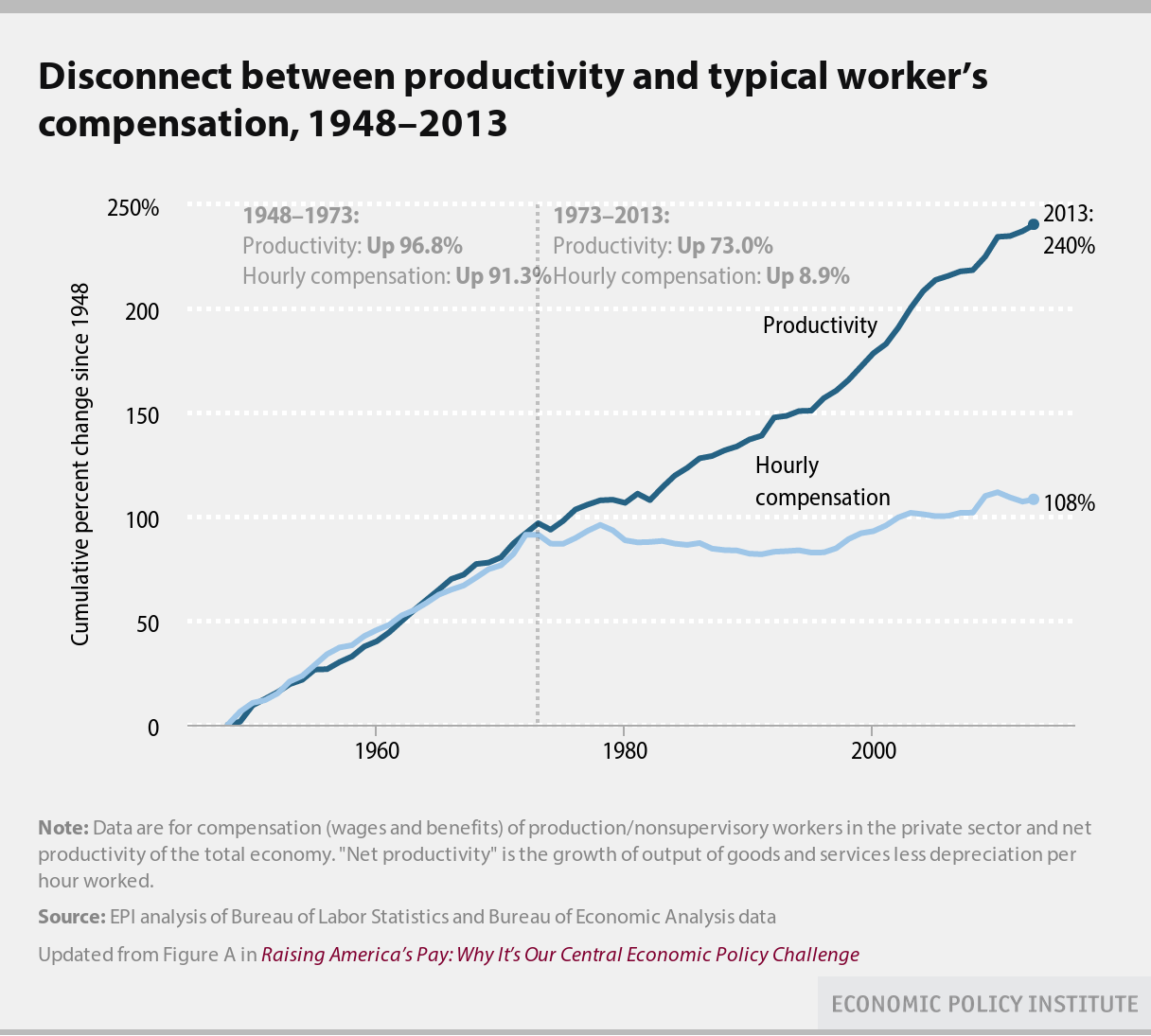Ezra Klein interviews economist Adam Posen in Vox, Why one top economist thinks Obama’s trade deal is worth passing. Reviewing Posen’s six arguments:
Category Archives: Economics
Let’s make a deal
Barney Frank was on Radio Boston today discussing the TPP. As usual, he was very sharp. He understands both the significance of the TPP and the value of making deals with the opposition party. His suggestion: Get some legislative concessions from Republicans now in exchange for supporting the TPP because you’re not going to get any concessions from them once the TPP passes. Conditional support for the TPP is leverage. Use it.
You can listen to the interview here:
Slow gains are still gains
From the Economic Policy Institute:
The total number of job openings fell slightly to 5.0 million in March and the number of unemployed workers fell slightly to 8.6 million. Taken together, the result was a job-seekers-to-job-openings ratio that held steady at 1.7. This ratio has been declining steadily from its high of 6.8-to-1 in July 2009, as shown in the figure below.
Thought for the Day: 06 May 2015
Brad DeLong has a recent post, The Debate Over the TPP. Commenter Nils:
Can anyone detail the *actual problems* facing international trade, which would be fixed all or in part by TPP? And I don’t mean “my pharmaceutical company isn’t getting to charge as much as it wants to for every dose of its patented products sold in the world.” That’s not a trade problem, it’s a whine.
Krugman on poverty
From his column in today’s NY Times:
It has been disheartening to see some commentators still writing as if poverty were simply a matter of values, as if the poor just mysteriously make bad choices and all would be well if they adopted middle-class values. Maybe, just maybe, that was a sustainable argument four decades ago, but at this point it should be obvious that middle-class values only flourish in an economy that offers middle-class jobs.
The great sociologist William Julius Wilson argued long ago that widely-decried social changes among blacks, like the decline of traditional families, were actually caused by the disappearance of well-paying jobs in inner cities. His argument contained an implicit prediction: if other racial groups were to face a similar loss of job opportunity, their behavior would change in similar ways.
And so it has proved. Lagging wages — actually declining in real terms for half of working men — and work instability have been followed by sharp declines in marriage, rising births out of wedlock, and more.
So it is, as I said, disheartening still to see commentators suggesting that the poor are causing their own poverty, and could easily escape if only they acted like members of the upper middle class.
… there is no excuse for fatalism as we contemplate the evils of poverty in America. Shrugging your shoulders as you attribute it all to values is an act of malign neglect. The poor don’t need lectures on morality, they need more resources — which we can afford to provide — and better economic opportunities, which we can also afford to provide through everything from training and subsidies to higher minimum wages. Baltimore, and America, don’t have to be as unjust as they are.
Related reading: Monica Potts, What’s Killing Poor White Women?
I’ll add that wider availability of middle-class jobs wouldn’t mean that everyone who works one will adopt “middle-class values” but without the former expect that life will be pretty rough.
Why spoil a good story with the facts?
It’s not news that David Brooks is a pretentious contemptible ass, that he plays fast and loose with facts and at times even ignores them completely. He was in fine form today with “The Nature of Poverty”. (It reminded me of his post-earthquake Haiti column from 2010.) When it comes to substance, his columns are without merit but they do have modest entertainment value. Spotting the BS in them is a bit like playing Minesweeper or Tetris. It keeps you entertained for a few minutes while you’re procrastinating. Anyhow, one sentence in his column today caught my attention in particular:
As Robert Samuelson of The Washington Post has pointed out, in 2013 the federal government spent nearly $14,000 per poor person.
And I think to myself, “Ya know, that sounds like a stretch.” Low and behold Dean Baker had already called bullshit. From “David Brooks and the Federal Government’s $14,000 Per Year Per Poor Person”: Continue reading
America’s spending problem
The lead paragraphs to Thomas Hungerford’s “Let’s Face It – We’re Far From Broke“:
The relationship between tax policy and spending policy in the United States has changed dramatically over the past 200 years (Ippolito 2012). Kimmel (1959, 7) notes that for the first 140 years, “federal budget policy was concerned mainly with the money costs of government and raising the revenues to meet them.” In recent years, only one of the two major political parties continued to view fiscal policy this way. Democratic proposals for spending increases or tax cuts have routinely been “paid for” with new revenue sources or by offsetting spending reductions.1 For Republicans, however, tax and spending decisions appear to be developed in isolation from one another and with little regard to any impact on deficits and federal debt, with both tax cuts and spending increases unaccompanied by financing sources undertaken during Republican administrations. When Republican policy makers do pay attention to deficits, they tend to focus only on the spending side of the budget. For example, House Speaker John Boehner (R-Ohio), speaking for many in the GOP, argues, “Washington has a spending problem. Let’s face it—we’re broke” (Boehner 2012).
This is clearly wrong. While the federal government is projected to run deficits far into the future, the U.S. economy is projected to generate substantial amounts of income growth far into the future. This means the real fiscal challenge is simply the political problem of raising revenues that are sufficient to meet our spending needs. Indeed, the Constitution (Article I, Section 8) provides Congress with the power to raise revenue “to pay the debts and provide for the common Defense and general Welfare of the United States.” This issue brief examines our nation’s fiscal situation and identifies what the real challenges on the spending and revenue sides are….
Today’s charts
Larry Mishel and Rep. Jan Schakowsky, “People’s Budget” vs. Republican Plan
Larry Mishel and Rep. Jan Schakowsky on the Economic Policy Institutes’ blog:
The annual federal budget debate typically doesn’t excite many folks outside the Washington beltway. And with good reason—the Republican budget process is intended to lull the public to sleep by staying short on details and long on damaging provisions that will hurt low-income and middle-class families.
But folks should pay attention to the debate because budgets have consequences—and if done right, they can truly move our country forward. The “People’s Budget,” which we both helped prepare, is a bold and responsible alternative to the Republican plans that take from working families while giving more to corporations and the wealthy.
The GOP budgets proposed in Congress would cut about $5 trillion over the next decade. The overwhelming burden would fall on programs that boost working families: education, Medicare and Medicaid, college aid, job training, medical research and rebuilding roads and bridges. Tens of millions of Americans would lose health insurance and millions more would lose food stamps or be priced out of college.
Republicans push these devastating cuts as a path to a balanced budget. But their budgets have been widely panned by experts as being based on “magic asterisks.” While they’re comfortable putting the squeeze on working families who will be most affected by these cuts in benefits and services, they refuse to ask corporations and the wealthy to contribute one thin dime to the effort. In fact, not one tax loophole is closed by their budgets.
Senate Committee Debates Whether to Allow H-1B Guestworkers to Replace U.S. IT Workers
This relates to an earlier post, Using the H-1B visa program to screw American workers. From Ross Eisenbrey, Senate Committee Debates Whether to Allow H-1B Guestworkers to Replace U.S. IT Workers:
The Senate Judiciary Committee explored important economic questions this week. Should businesses be able to lay off qualified U.S. tech workers and replace them with lower paid foreign workers? Is there a shortage of skilled Science, Technology, Engineering and Math (STEM) workers—or an oversupply? And even if there is such a shortage, should we import temporary non-immigrant labor from abroad, or would it be better to let the free market work long enough for wages to rise and more students to be attracted to these fields?
The committee’s Republican and Democratic members disagreed with each other without regard to party labels. No senator, in fact, seemed more concerned about the rights of U.S. workers and their economic outcomes—and more skeptical of claims made by the business community—than Sen. Jeff Sessions of Alabama, a conservative, anti-union Republican. Two Democrats, Sen. Amy Klobuchar (D-MN) and Sen. Chuck Schumer (D-NY) took the side of big business, along with Sen. Orrin Hatch (R-UT), Sen. John Cornyn (R-TX) and Sen. Jeff Flake, while Sen. Dick Durbin (D-IL) and Sen. Chuck Grassley (R-IA) defended the interests of U.S. workers.
Politics makes strange bedfellows. Reading on:
Most Americans probably think it is illegal to lay off an U.S. worker and replace him with a temporary foreign worker. Yet Prof. Ron Hira and several other witnesses testified that this is not just a common practice, it is the primary use of the H-1B visa program….
Read Eisenbrey’s entire post here. Related links:
- Beryl Lieff Benderly, Another funny thing happened on the way to the STEM shortage
- Jordan Weissmann, The Myth of America’s Tech-Talent Shortage
- Robert Charette, The STEM Crisis Is a Myth
- Robert Charette, Exposing the Roots of the Perpetual “STEM Crisis”
- Robert Charette, Are STEM Workers Overpaid?
Late addition, 11/23/2015:


